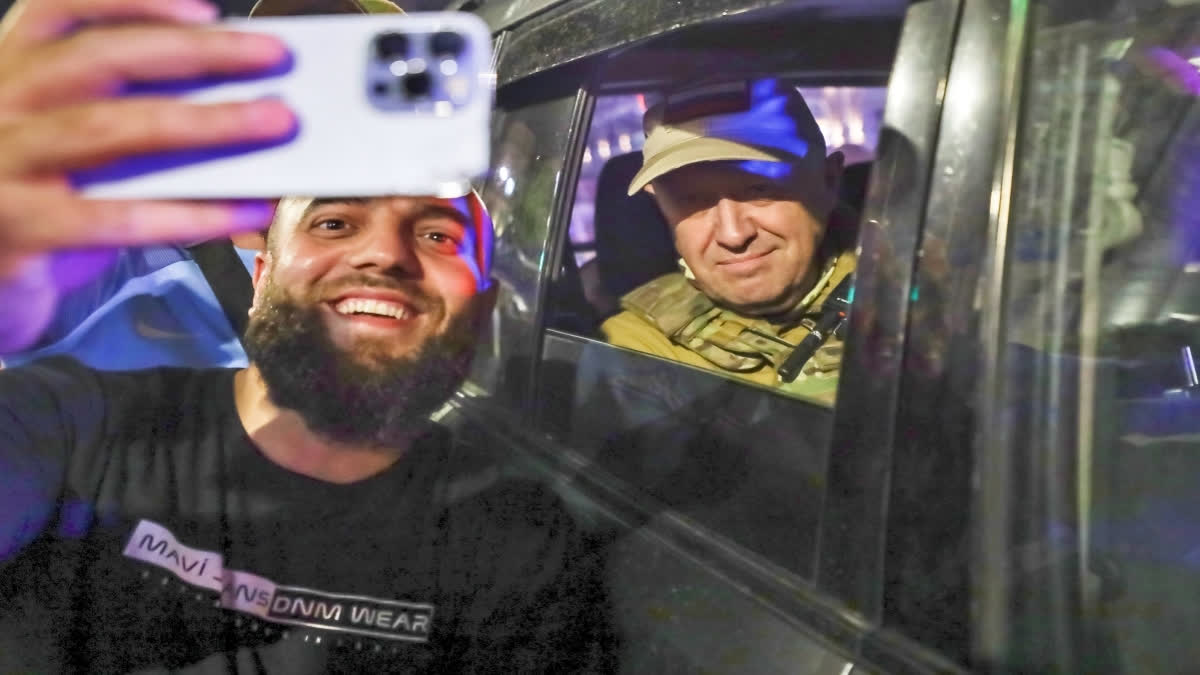Moscow:The greatest challenge to Russian President Vladimir Putin in his more than two decades in power fizzled out after the rebellious mercenary commander who ordered his troops to march on Moscow abruptly reached a deal with the Kremlin to go into exile and sounded the retreat.
The brief revolt, though, exposed vulnerabilities among Russian government forces, with Wagner Group soldiers under the command of Yevgeny Prigozhin able to move unimpeded into the Russian city of Rostov-on-Don and advance hundreds of kilometers (miles) toward Moscow. The Russian military scrambled to defend Russia's capital.
Under the deal announced Saturday by Kremlin spokesman Dmitry Peskov, Prigozhin will go to neighboring Belarus, which has supported Russia's invasion of Ukraine. Charges against him of mounting an armed rebellion will be dropped. The government also said it would not prosecute Wagner fighters who took part, while those who did not join in were to be offered contracts by the Defense Ministry. Prigozhin ordered his troops back to their field camps in Ukraine, where they have been fighting alongside Russian regular soldiers.
By Sunday morning there were still no reports of Prigozhin arriving in Belarus. Many other questions remained unanswered, including whether Prigozhin would be joined in exile by any of Wagner’s troops and what role, if any, he might have there. Prigozhin, who sent out a series of audio and video updates during his revolt, has gone silent since the Kremlin announced that the deal had been brokered for him to end his march and leave Russia.
Video taken by The Associated Press in Rostov-on-Don showed people cheering Wagner troops as they departed. Some ran to shake hands with Prigozhin, who was riding in an SUV. The regional governor later said that all of the troops had left the city. Putin had vowed earlier to punish those behind the armed uprising led by his onetime protege. In a televised speech to the nation, he called the rebellion a “betrayal” and “treason.”
Also read: 'Stab in the back': Putin vows to crush 'mutiny' by Russian mercenary chief
In allowing Prigozhin and his forces to go free, Peskov said, Putin’s “highest goal” was “to avoid bloodshed and internal confrontation with unpredictable results.” The risk for Putin is whether he will be seen as weak, analysts said. “Putin has been diminished for all time by this affair,” former U.S. Ambassador to Ukraine John Herbst said on CNN.
Early Saturday, Prigozhin’s private army appeared to control the military headquarters in Rostov-on-Don, a city 660 miles (over 1,000 kilometers) south of Moscow, which runs Russian operations in Ukraine, Britain’s Ministry of Defense said.
Moscow braced for the arrival of the Wagner forces by erecting checkpoints with armored vehicles and troops on the city’s southern edge. About 3,000 Chechen soldiers were pulled from fighting in Ukraine and rushed there early Saturday, state television in Chechnya reported. Russian troops armed with machine guns put up checkpoints on Moscow's southern outskirts. Crews dug up sections of highways to slow the march.
Wagner troops advanced to just 200 kilometers (120 miles) from Moscow, according to Prigozhin. But after the deal was struck, Prigozhin announced that he had decided to retreat to avoid “shedding Russian blood.” A U.S.-based think tank argued that Prigozhin’s rebellion “exposed severe weaknesses” in the Kremlin and the Ministry of Defense.
The Institute for the Study of War said that the Kremlin struggled to put up a coherent response to the rebellion, and that one reason was likely the impact of heavy Russian losses in Ukraine. “Wagner likely could have reached the outskirts of Moscow if Prigozhin chose to order them to do so,” the institute said.
On Sunday morning some restrictions were still in place along the main highway between Moscow and Rostov-on-Don though traffic restrictions were gradually being lifted in other places. Prigozhin had demanded the ouster of Defense Minister Sergei Shoigu, whom Prigozhin has long criticized in withering terms for his conduct of the 16-month-long war in Ukraine.
